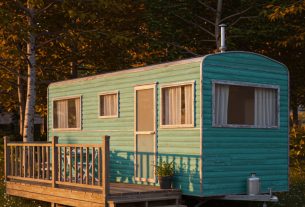When I first considered buying a mobile home, I was filled with excitement and trepidation. The allure of affordable housing options and the flexibility of living arrangements appealed to me. However, I quickly realized that the decision was not as straightforward as it seemed. This article is my journey through the complexities of mobile home ownership, where I aim to provide you with valuable insights, statistics, and real-life examples to help you navigate the decision of whether or not to invest in a mobile home.
The Allure of Mobile Homes
Mobile homes, also known as manufactured homes, have gained popularity for a variety of reasons:
- Affordability: The cost of mobile homes is generally lower than traditional homes, making them an attractive option for many.
- Flexibility: Mobile homes can be moved, allowing for adaptability in location and lifestyle.
- Community: Many mobile home parks foster a strong sense of community among residents.
- Variety: There are numerous styles and sizes available, catering to diverse preferences.
According to the U.S. Census Bureau, the average price of a new manufactured home was approximately $87,100 in 2020. This is a significant contrast to the median price of a single-family home, which was around $347,500. These figures highlight why mobile homes can be an appealing option for many individuals and families.
Understanding the Risks
While there are many advantages to owning a mobile home, it’s essential to consider the potential risks involved:
- Depreciation: Unlike traditional homes, mobile homes can depreciate in value over time, especially if placed on rented land.
- Financing Challenges: Securing a loan for a mobile home can be more complicated than for traditional homes, with higher interest rates and fewer lending options available.
- Community Restrictions: Living in a mobile home park may come with specific rules and regulations that can limit your freedom.
- Maintenance Costs: While mobile homes may have lower initial costs, maintenance and repair costs can add up over time.
As I delved deeper into the risks, I stumbled upon a study by the National Multifamily Housing Council, which indicated that mobile homes depreciate at a rate of approximately 3-4% annually. This statistic was a wake-up call for me, prompting further research into the long-term implications of ownership.
Case Studies: Real-Life Experiences
To understand the reality of mobile home ownership, I gathered stories from individuals who have taken the plunge. Here are a few insights:
Case Study 1: Sarah’s Experience
Sarah purchased a mobile home in a park in Florida. Initially thrilled by the affordability, she soon encountered issues with the park management. “I didn’t realize there would be so many restrictions,” she shared. “From pet policies to home renovations, I felt my freedom was limited.” Despite these challenges, Sarah found joy in the community she built, highlighting the importance of understanding park rules before committing.
Case Study 2: Mark’s Journey
Mark bought a used mobile home and placed it on his own land. While he appreciated the autonomy, he learned that maintenance costs were higher than anticipated. “I thought I’d save money, but repairs came out of nowhere,” he recounted. Mark’s experience underscores the need for thorough inspections and budgeting for future expenses.
What to Look for When Buying a Mobile Home
If you’re considering buying a mobile home, here are some critical factors to keep in mind:
- Location: Research the area and the mobile home park’s reputation. Is it safe? Are there amenities nearby?
- Condition: Hire a professional inspector to evaluate the home for structural issues or signs of wear and tear.
- Financing Options: Explore different lenders and understand the terms of your loan. Consider working with a financial advisor.
- Community Rules: Familiarize yourself with the park’s regulations to avoid future conflicts.
- Insurance: Make sure to get adequate insurance coverage, as mobile homes can be more susceptible to damage from natural disasters.
By taking these steps, I felt more empowered in my decision-making process and could mitigate some of the risks associated with mobile home ownership.
The Financial Perspective
Financing a mobile home can be one of the most daunting tasks. Here are some key points to consider:
- Types of Loans: Mobile homes can be financed through personal loans, chattel loans for homes on rented land, or traditional mortgages for homes on owned land.
- Interest Rates: Be prepared for higher interest rates compared to traditional mortgages. Research various lenders to find the best rates.
- Down Payment: Many lenders require a higher down payment for mobile homes, typically around 20%.
- Credit Score: A good credit score can significantly impact your financing options. Work on improving your credit before applying for a loan.
According to the U.S. Department of Housing and Urban Development, many buyers often face challenges securing financing, as lenders view mobile homes as higher risk. This reality hit home when I spoke to a potential buyer who was denied a loan due to her credit history, despite having a steady income.
Maintenance and Longevity
Maintaining a mobile home is crucial to ensure its longevity. Here are some maintenance tips I found invaluable:
- Regular Inspections: Schedule annual inspections to catch potential issues early.
- Roof Care: Inspect and maintain the roof regularly to prevent leaks and water damage.
- Skirting Maintenance: Ensure that the skirting around the home is intact to protect against pests and weather damage.
- Utilities Check: Regularly check plumbing and electrical systems, as older mobile homes may have outdated wiring or piping.
According to a report by the National Association of Home Builders, homes that receive regular maintenance can last up to 30 years, contrary to the common belief that mobile homes have a shorter lifespan. This statistic was a revelation for me, proving that with the right care, mobile homes can be a viable long-term housing solution.
Is It Worth It? The Pros and Cons
Ultimately, the decision to buy a mobile home comes down to weighing the pros and cons:
Pros:
- Lower initial cost compared to traditional homes.
- Flexibility in living arrangements.
- A sense of community in mobile home parks.
- Potential for owning land, which can appreciate over time.
Cons:
- Depreciation and potential loss of value.
- Financing challenges and higher interest rates.
- Community restrictions and regulations.
- Maintenance and repair costs that can accumulate over time.
Reflecting on these pros and cons helped me clarify my priorities and align them with my long-term goals.
Environmental Considerations
In today’s world, sustainability is becoming increasingly important. Mobile homes can be a more environmentally friendly option if built with energy-efficient materials and systems. Here are some considerations:
- Energy Efficiency: Look for homes that are ENERGY STAR certified or have energy-efficient appliances.
- Construction Materials: Consider homes made from sustainable materials that reduce waste and carbon footprint.
- Location Impact: Assess the environmental impact of your chosen location, including proximity to schools, workplaces, and transportation.
According to the Environmental Protection Agency, sustainable living can lead to lower utility costs and a reduced environmental impact. I was motivated to explore eco-friendly options when considering my mobile home purchase, realizing that it could positively impact both my wallet and the planet.
Community Engagement and Support
One of the unique aspects of mobile home living is the sense of community. Engaging with your neighbors can enhance your living experience:
- Participate in Events: Many parks host community events that can help you bond with your neighbors.
- Join Committees: Get involved in park management committees to have a say in community rules and improvements.
- Online Groups: Join online forums and social media groups dedicated to mobile home living for support and advice.
By actively participating in my mobile home community, I have developed lasting friendships and valuable connections that made my living experience much more enjoyable.
Conclusion: Is It Safe to Buy a Mobile Home?
In conclusion, the decision to buy a mobile home is multifaceted, requiring careful consideration of various factors such as financial implications, community dynamics, and maintenance responsibilities. While mobile homes offer unique advantages, they also come with risks that should not be overlooked. As I navigated my journey, I found that knowledge and preparation were my greatest allies.
Ultimately, whether a mobile home is the right choice for you depends on your personal circumstances and priorities. I encourage you to weigh the pros and cons, seek advice from current owners, and thoroughly research your options before making a decision.
Frequently Asked Questions (FAQ)
1. Are mobile homes safe to live in?
Yes, mobile homes can be safe to live in if properly maintained and placed in a reputable community. Ensure that you conduct thorough inspections and research before purchasing.
2. How long do mobile homes last?
With proper maintenance, mobile homes can last for several decades. Regular inspections and care are crucial for longevity.
3. Can I get a mortgage for a mobile home?
Yes, you can secure a mortgage for a mobile home, but financing options may vary. It’s essential to research lenders and financing solutions specific to mobile homes.
4. What should I look for in a mobile home park?
Look for community amenities, park management reputation, safety, and regulations that align with your lifestyle.
Thank you for joining me on this exploration of mobile home ownership. If you found this article helpful, please consider signing up for our newsletter for more insights and sharing it with friends and on social media. Let’s keep the conversation going!
Camco TST MAX RV Toilet Treatment Drop-INs - Control Unwanted Odors & Break Down Waste and Tissue - Safe Septic Tank Treatment - Orange Scent, 30-Pack (41183)
$13.35 (as of November 16, 2025 07:53 GMT -03:00 - More infoProduct prices and availability are accurate as of the date/time indicated and are subject to change. Any price and availability information displayed on [relevant Amazon Site(s), as applicable] at the time of purchase will apply to the purchase of this product.)
Sign up for our newsletter and stay up to date with exclusive news
that can transform your routine!





